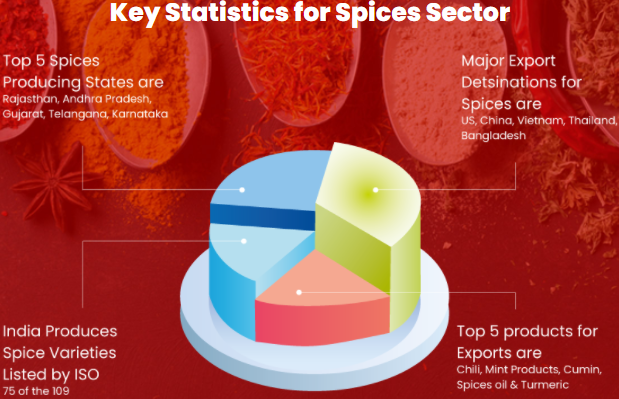Indian Economy
Spices Sector in India
- 23 Dec 2021
- 4 min read
For Prelims: Major Spice Producing States, Key Statistics for Spices Sector
For Mains: Spices Production in India, Initiative Taken for the Spices Sector
Why in News
Recently, the Minister for Agriculture and Farmers Welfare has released the book ‘Spices Statistics at a Glance 2021.
- The book highlights the growth achieved in the production of spices and increase in area during the last seven years from 2014-15 to 2020-21 in the country.
Key Points
- About Spices:
- Spices are aromatic flavorings from seeds, fruits, bark, rhizomes, and other plant parts.
- They are used to season and preserve food, and as medicines, dyes, and perfumes.
- Spices have been highly valued as trade goods for thousands of years.
- The word spice comes from the Latin species, which means merchandise, or wares.
- The demand of spices has tremendously increased due to the recognition of spices as a health supplement especially during the pandemic period.
- This can be clearly seen from the growing export of spices like turmeric, ginger, cumin, chilli etc.
- Spices Production In India:
- India is the world's largest producer, consumer and exporter of spices.
- Due to the varying climates - from tropical to subtropical to temperate-almost all spices grow splendidly in India.
- In reality almost all the states and union territories of India grow one or the other spices.
- Under the act of Parliament, a total of 52 spices are brought under the purview of the Spices Board.
- Spices Board (Ministry of Commerce and Industry) is the flagship organization for the development and worldwide promotion of Indian spices.
- It was established by the Spices Board Act, 1986.
- In India, there are some states which grow the spices that have very high value in both national and international markets.
- The best example is Kashmiri saffron which is the world’s best saffron.
- The Kashmir saffron has got Geographical Indication (GI) tag status.
- Spices Trade:
- The export of spices contributes 41% of the total export earnings from all horticulture crops in the country.
- It ranks fourth among agricultural commodities, falling behind only the marine products, non basmati rice and basmati rice.
- Related Government Initiative:
- Recently, the Food Safety and Standards Authority of India (FSSAI) inaugurated the fifth session of the Codex Committee on Spices and Culinary Herbs (CCSCH) established under Codex Alimentarius Commission (CAC).
- About the Codex Committee on Spices and Culinary Herbs (CCSCH):
- Establishment: It was formed in 2013.
- Terms of Reference:
- To elaborate worldwide standards for spices and culinary herbs in their dried and dehydrated state in whole, ground, and cracked or crushed form.
- To consult, as necessary, with other international organizations in the standards development process to avoid duplication.





